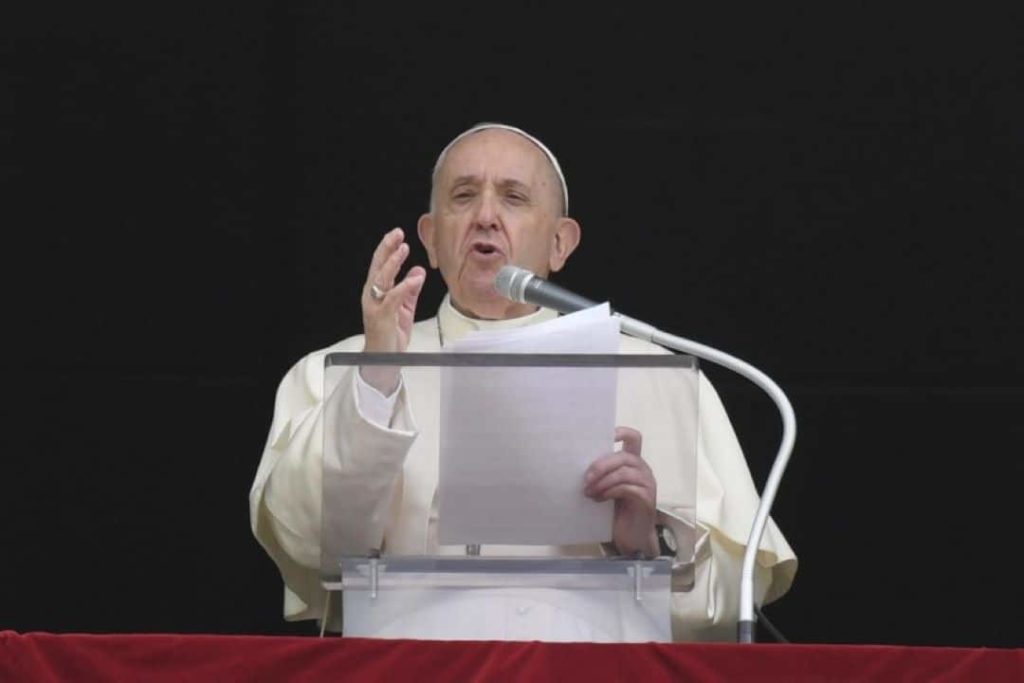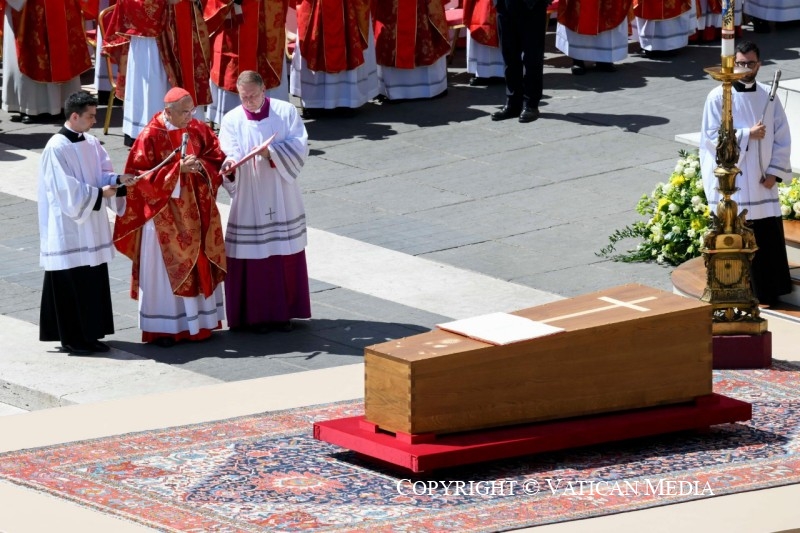Pope Reflects on a Temptation and an Exhortation
Holy Father's Angelus Address for September 26, 2021

Pope Francis today reflected on a temptation and an exhortation in his commentary before praying the noonday Angelus with the faithful gathered in St. Peter’s Square.
The Holy Father’s words were based on the Gospel of the day from the 9th chapter of Mark:
At that time, John said to Jesus,
“Teacher, we saw someone driving out demons in your name,
and we tried to prevent him because he does not follow us.”
Jesus replied, “Do not prevent him.
There is no one who performs a mighty deed in my name
who can at the same time speak ill of me.
For whoever is not against us is for us.
Anyone who gives you a cup of water to drink
because you belong to Christ,
amen, I say to you, will surely not lose his reward.
The Pope explained the importance of Jesus’ words, noting the temptation to be closed to the good works of others. The disciples are concerned that someone outside their group is doing good, which the Pope warns can be a temptation among some in the Church today.
“At times we too, instead of being humble and open communities, can give the impression of being the ‘top of the class’ and keeping others at a distance; instead of trying to walk with everyone, we display our ‘believer’s license’ so as to judge and exclude,” the Pope said. ” Let us ask for the grace to overcome the temptation to judge and to categorize, and may God preserve us from the ‘nest’ mentality, that of jealously guarding ourselves in the small group of those who consider themselves good: the priest with his loyal followers, the pastoral workers closed up among themselves so that no one can infiltrate, the movements and associations in their own particular charism, and so on.”
The Holy Father went on to explain Christ’s exhortation: “instead of judging everything and everyone, let us beware of ourselves! Indeed, the risk is that of being inflexible towards others and indulgent towards ourselves.”
Here is a working translation of the Holy Father’s commentary, provided by the Vatican:
Dear brothers and sisters, Buongiorno!
The Gospel of today’s Liturgy recounts a brief dialogue between Jesus and the Apostle John, who speaks on behalf of all the group of disciples. They saw a man who cast out demons in the name of the Lord, but they stopped him because he was not part of their group. At this point, Jesus invites them not to hinder those who do good, because they contribute to the fulfillment of God’s plan (cf. Mk 9:38-41). Then He admonishes them: instead of dividing people into good and bad, we are all called to watch over our own hearts, lest we succumb to evil and bring scandal to others (cf. vv. 42-45, 47-48).
In short, Jesus’ words reveal a temptation and offer an exhortation. The temptation is that of closedness. The disciples would like to hinder a good deed simply because it is performed by someone who did not belong to their group. They think they have the “exclusive right over Jesus”, and that they are the only ones authorized to work for the Kingdom of God. But in this way, they end up considering themselves privileged and others as outsiders, to the extent of becoming hostile towards them. Indeed, every closure tends us to keep at a distance those who do not think as we do. This – we know – is the root of many great evils in history: of the absolutism that has often generated dictatorships and so much violence towards those who are different.
But we need to be vigilant about closure in the Church too. Because the devil, who is the divider – this is what the word “devil” means – always insinuates suspicions to divide and exclude. He tempts with cunning, and it can happen as with those disciples, who go so far as to exclude even those who had cast out the devil himself! At times we too, instead of being humble and open communities, can give the impression of being the “top of the class” and keeping others at a distance; instead of trying to walk with everyone, we display our “believer’s license” so as to judge and exclude. Let us ask for the grace to overcome the temptation to judge and to categorize, and may God preserve us from the “nest” mentality, that of jealously guarding ourselves in the small group of those who consider themselves good: the priest with his loyal followers, the pastoral workers closed up among themselves so that no one can infiltrate, the movements and associations in their own particular charism, and so on. All this runs the risk of turning Christian communities into places of separation and not of communion. The Holy Spirit does not want closedness; He wants openness, and welcoming communities where there is a place for everyone.
And then in the Gospel, there is Jesus’ exhortation: instead of judging everything and everyone, let us beware of ourselves! Indeed, the risk is that of being inflexible towards others and indulgent towards ourselves. And Jesus urges us not to descend to making pacts with evil, with striking images: “If something in you causes you to sin, cut it off!” (cf. 43-48). Jesus is radical, demanding, but for our own good, like a good doctor. Every cut, every pruning, is so we can grow better and bear fruit in love.
Let us ask, then: what is it in me that is contrary to the Gospel? What, in concrete terms, does Jesus want me to cut out of my life?
Let us pray to Mary Immaculate, that she may help us be welcoming towards others and vigilant over ourselves.
© Libreria Editrice Vatican
Related

Timothy Schmalz, the Pope’s Sculptor
Exaudi Staff
29 April, 2025
7 min

Cardinal Parolin at the Novendalia Mass: “Mercy leads us to the heart of faith”
Exaudi Staff
27 April, 2025
8 min

Pope Francis’ Tomb in Santa Maria Maggiore
Exaudi Staff
27 April, 2025
1 min

Mercy and the joy of the Gospel are two key concepts of Pope Francis
Exaudi Staff
26 April, 2025
9 min
 (EN)
(EN)
 (ES)
(ES)
 (IT)
(IT)

